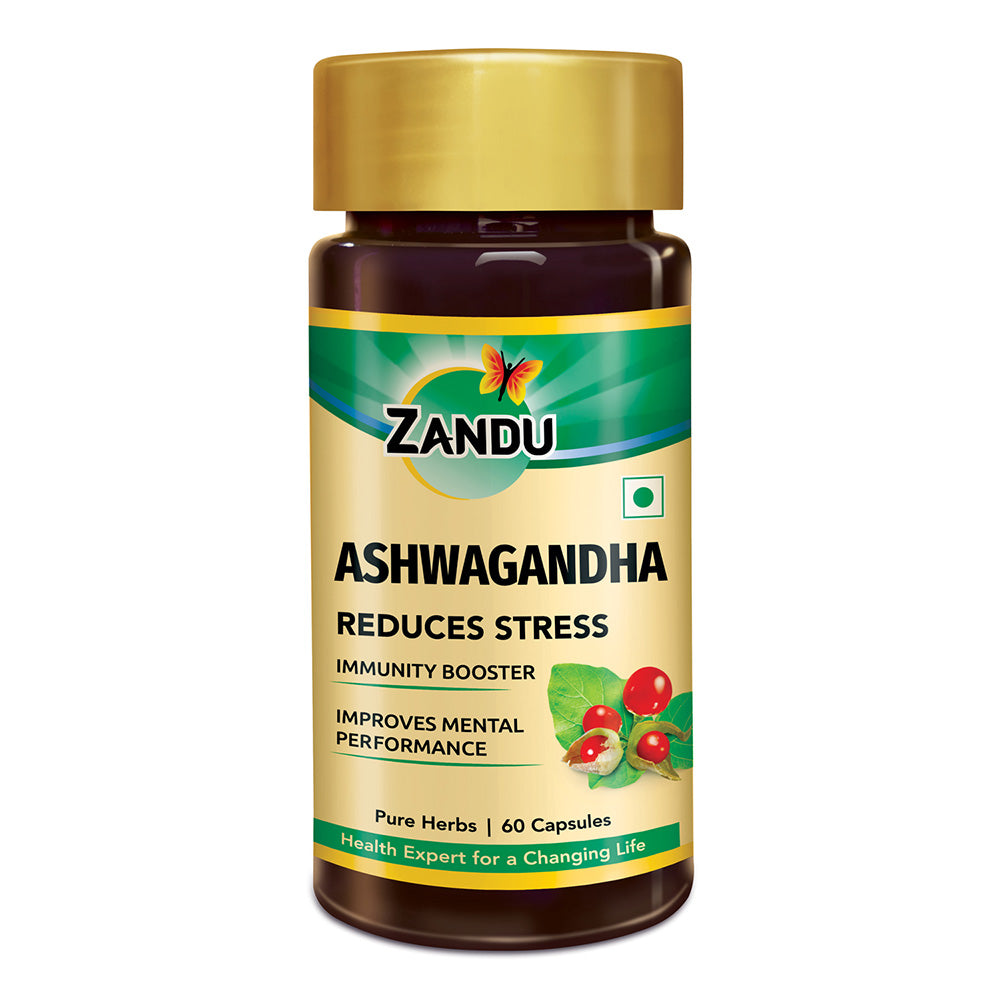
Reduces Stress & Anxiety | 100% Natural Active | Root Extract | Improves Mental Performance | Scientifically Proven

Reduces Stress & Cortisol, Improves Sleep and Muscle Recovery, with over 5% Withanolide Content | Scientifically Tested


|
Key insights:
|
Regarding supplements, Ashwagandha and Melatonin are popular choices for individuals looking to enhance their wellness routines. While each has distinct properties and uses, they offer potential benefits for managing stress, promoting relaxation, and more. This guide explores Ashwagandha and Melatonin, their unique benefits, key differences, and which might suit your wellness goals.
|
Did you know:
|

Ashwagandha is an ancient Indian herb used in Ayurvedic medicine to combat stress; studies show it lowers cortisol and aids sleep. Melatonin, on the other hand, is a natural brain hormone produced at night that regulates sleep-wake cycles; it rises in the dark, signalling rest, and falls in response to light, promoting wakefulness. In addition to sleep regulation, Melatonin is a powerful antioxidant.
Though different compounds, both Ashwagandha, made from shrub roots and berries, and synthetic melatonin supplements can improve sleep quality, especially in those with insomnia or irregular sleep cycles. Together or separately, the two work through different mechanisms to promote healthy, restful sleep.
|
Nutrient |
Melatonin |
Ashwagandha (per 100g) |
|
Melatonin |
Varies (typically 1-10 mg) |
N/A |
|
Calories |
0 |
245 Kcal (Approx.) |
|
Moisture |
N/A |
7.45% |
|
Ash |
N/A |
4.41 g |
|
Protein |
0 |
3.9 g |
|
Fat |
0 |
0.3 g |
|
Crude Fiber |
N/A |
32.3 g |
|
Carbohydrates |
0 |
49.9 g |
|
Iron |
N/A |
3.3 mg |
|
Calcium |
N/A |
23 mg |
|
Total Carotene |
N/A |
75.7 µg |
|
Vitamin C |
N/A |
3.7 mg |
|
Other Ingredients |
Varies (fillers like cellulose) |
N/A |
|
Aspect |
Ashwagandha |
Melatonin |
|
Primary Use |
Used as an adaptogen to help reduce stress, anxiety, and improve overall energy and mood. |
Primarily used as a sleep aid to regulate the sleep-wake cycle. |
|
Origin |
Derived from the root of the Withania somnifera plant, it is commonly used in Ayurvedic medicine. |
A hormone naturally produced by the pineal gland, available as a synthetic supplement. |
|
Mechanism of Action |
Works by balancing cortisol (stress hormone) levels and enhancing GABA receptors, promoting calmness and mental clarity. |
Mimics the body’s natural melatonin to signal the brain it's time to sleep, helping regulate sleep patterns. |
|
Common Dosage |
Typical dosage ranges from 300-600 mg per day. |
Dosage typically ranges from 1-10 mg, depending on individual needs and tolerance. |
|
Effects on Body |
It promotes relaxation, reduces stress, boosts immunity, and may enhance cognitive functions and stamina. |
It helps induce sleep, adjust sleep timing, and improve overall sleep quality. However, it does not directly affect stress or energy. |
|
Duration of Use |
Suitable for long-term use under guidance; effects may build over weeks. |
Typically recommended for short-term or intermittent use to avoid dependency or desensitisation. |
|
Side Effects |
Generally safe; minor effects may include drowsiness or mild digestive discomfort. |
Possible side effects include grogginess, dizziness, or daytime sleepiness if misused. |
|
Best Time to Take |
Often taken in the morning or evening, based on individual needs for stress and energy support. |
Recommended 30-60 minutes before bedtime to help with sleep onset. |
|
Other Benefits |
Potential benefits for immune support, muscle recovery, and cognitive function. |
Limited to sleep regulation, with some use in jet lag management. |
Below are the health benefits of Ashwagandha and Melatonin:
Here are the health benefits of Ashwagandha:

Perhaps the most well-known benefit of ashwagandha is its ability to reduce stress. A number of research studies highlight this benefit, showing that Ashwagandha can dramatically lower individuals' levels of stress and anxiety.
According to one study, Ashwagandha can also improve sleep quality; researchers found that participants who took the herb slept significantly better than those who took a placebo.
Ashwagandha may help women with sexual dysfunction, according to at least one clinical trial. According to the reports, Ashwagandha treatment significantly increased their levels of arousal, lubrication, orgasm, and satisfaction.
Along with improving measures of anxiety related to their sexuality and sex lives, it also markedly increased the number of successful sexual interactions.
Ashwagandha is sometimes taken to promote better sleep. According to one study, 65-80-year-old adults consumed 600mg of Ashwagandha root daily for 12 weeks. Compared to a placebo, it significantly improved their sleep quality and alertness on waking.
A review of 5 quality studies also showed small but meaningful effects of ashwagandha on sleep. It enhanced overall sleep quality, reduced anxiety, and increased wake-time alertness. These benefits were greater for those with insomnia and those taking over 600mg of Ashwagandha for at least 8 weeks.
So, evidence suggests Ashwagandha, especially in higher doses over 2 months, can aid sleep issues in older adults by decreasing anxiety and promoting sounder, more refreshing sleep.

Ashwagandha may enhance cognitive function, memory, and the capacity to execute motor reactions upon instruction. In small trials, it has been shown to considerably enhance participants' reaction times during cognitive and psychomotor tests (which assess the ability to follow instructions and carry out a suggested activity) when compared to a placebo.
According to one study, Ashwagandha even considerably increased participants' attention spans and their immediate and general memory on several tasks.
Ashwagandha has compounds, including withanolides, that can decrease inflammation. Animal research found withanolides reduced inflammatory proteins like interleukin-10. Some human studies show similar anti-inflammatory effects. One recent study gave COVID-19 patients an Ayurvedic formulation with 0.5 grams of ashwagandha twice daily for a week.
Compared to the placebo, it significantly lowered inflammatory markers C-reactive protein, interleukin-6, and tumour necrosis factor-alpha. So, Ashwagandha shows potential to combat inflammation through various mechanisms, as evidenced by decreased levels of key inflammatory biomarkers in both animals and humans. More research is still needed on optimal dosing.
Do check our Ashwagandha product range:
Here are some of the health advantages of Melatonin:

Studies show melatonin may also treat eye conditions like glaucoma and age-related macular degeneration (AMD). One study gave 100 people with AMD a melatonin supplement for 6-24 months. It helped protect the retina, delay AMD damage and maintain clear vision.
Another study in rats found melatonin decreased the severity and frequency of retinopathy, an eye disease affecting the retina that can cause vision loss.
While this early research is promising for melatonin and eye health, more studies in humans are still needed to understand the long-term effects of melatonin supplements on eyes. However, the antioxidant properties show potential benefits for certain eye conditions.
Melatonin has antioxidant properties that may help prevent certain cancers. It can limit DNA damage, leading to tumour growth. In addition, Melatonin may also disrupt cancer cell division and restrict blood supply to tumours. Some evidence finds melatonin reduces risk factors for hormone-related cancers like breast and prostate cancer.
Additionally, Melatonin may help lower compounds that promote tumour blood vessel formation. More research is still needed, but Melatonin’s anticancer abilities, low toxicity, and various health benefits make it a promising supplemental cancer treatment through multiple mechanisms, such as limiting angiogenesis and proliferative signalling.
Insomnia sufferers struggle to stay asleep, fall asleep, or both. Chronic insomnia is the term used to describe symptoms that last for one month or more.
The American Academy of Sleep Medicine's (2017) and the American College of Physicians' (2016) practice guidelines state that insufficient solid evidence supports the use of melatonin supplements for treating persistent insomnia. The American College of Physicians guidelines highly recommend cognitive behavioural therapy for insomnia (CBT-I) as the first line of treatment for insomnia.

Gastroesophageal reflux disease (GERD) causes stomach acid to back up into the oesophagus, leading to symptoms like heartburn. Melatonin may help treat GERD in a few ways. It can reduce stomach acid secretion and lower levels of compounds that relax the muscles separating the oesophagus from the stomach.
This prevents acid reflux. Studies show melatonin supplements alone or with traditional GERD medications can relieve heartburn and other symptoms. One study found a supplement containing Melatonin and other ingredients reduced GERD symptoms in more people than a common GERD medication alone. Due to its multi-pronged approach to acid reduction, Melatonin shows promise in supporting GERD treatment.
The Mediterranean diet's cardiovascular benefits partially come from melatonin-rich foods. Most studies show Melatonin improves heart health against ischemia-reperfusion injury using high supplemental doses of melatonin. However, other research found physiological melatonin concentrations, like levels in red wine, can still significantly decrease infarct size after injury.
This cardioprotective effect activates the SAFE pathway, which lowers mitochondrial reactive oxygen species. More research is still needed to determine if melatonin from foods alone at dietary levels provides the same cardiovascular protection as high-dose supplements or if higher amounts are necessary. However, current evidence confirms melatonin's role in promoting heart health.
Quality sleep is essential for strong immunity and overall health. If poor sleep is affecting your energy levels or immune response, explore Ayurvedic sleep medicine that not only promotes better rest but also helps balance your doshas naturally.
Here are the side effects of both Ashwagandha and Melatonin:
Ashwagandha and Melatonin work differently but complement each other well for relieving anxiety and promoting sleep. Ashwagandha is an adaptogenic herb that helps the body deal with stress. It uplifts mood, lowers levels of the stress hormone cortisol, and induces relaxation, which in turn enhances sleep quality. On the other hand, Melatonin is a naturally occurring sleep hormone that helps control sleep and wake cycles. It helps manage anxiety levels and is useful for combatting excessive stress.
You can take Ashwagandha at night by mixing it in milk or opt for a supplement that contains effective doses of both Ashwagandha and Melatonin. It's best to take melatonin about 30 minutes before bedtime since, unlike pharmaceutical sleep aids, melatonin works gradually with your body's natural circadian rhythms. The combination of Ashwagandha easing anxiety and nervous system hyperactivity, along with Melatonin regulating sleep-wake cycles, can promote deeper, anxiety-free sleep.
Also, check our other Ashwagandha Comparison Guide:
Although they function differently, Ashwagandha and Melatonin each serve unique purposes in supporting wellness. Ashwagandha offers long-term benefits for stress, energy, and mental clarity, while Melatonin is effective as a short-term solution for regulating sleep patterns. Understanding your wellness goals and consulting with a healthcare provider can help you choose which supplement is best suited for your needs.
Yes, Ashwagandha is often taken daily and is generally safe for long-term use. Consistent use over time can provide the best results for stress management, mental clarity, and energy.
Ashwagandha can help improve energy levels and reduce fatigue, making it popular among individuals looking for an endurance or performance boost. Melatonin, however, is mainly used for sleep and may not directly improve daytime energy.
Ashwagandha dosages generally range from 250 mg to 600 mg daily, while Melatonin is typically taken in doses from 0.5 mg to 10 mg, depending on the need. It’s best to start with a lower dose and consult a healthcare provider to find the right amount for you.
Melatonin is generally safe for short-term use, but it’s not recommended for long-term daily use without medical guidance. Regular use can potentially disrupt your body’s natural melatonin production, leading to dependency.

Reduces Stress & Anxiety | 100% Natural Active | Root Extract | Improves Mental Performance | Scientifically Proven

Reduces Stress & Cortisol, Improves Sleep and Muscle Recovery, with over 5% Withanolide Content | Scientifically Tested
Leave a comment
This site is protected by hCaptcha and the hCaptcha Privacy Policy and Terms of Service apply.